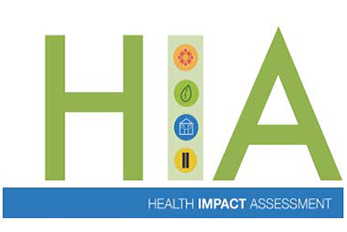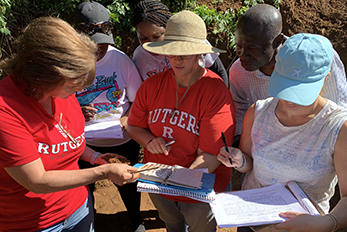Main Content
Learn how Health Impact Assessment (HIA) combines scientific data, health expertise, and public input to consider the health effects of policies, programs, or projects.

Course Status Notice – Not Scheduled
We do not have an offering of this course scheduled at this time. Please join our email list to be notified when the next offering is scheduled!
Jump to: Overview | Instructor | Reviews | CE Credits | Contact Us | Related Courses | Join Email List
Course Overview

Health Impact Assessment (HIA) can be used to evaluate a proposed plan or project’s potential effects on the health of a population. HIA provides evidence-based recommendations aimed at enhancing positive health impacts and minimizing negative ones, providing an approach to the decision-making process by:
- Considering health outcomes such as social, economic, and environmental influences;
- Convening diverse members of the public to elicit multiple perspectives and input;
- Identifying groups of people who might be particularly vulnerable to health impacts; and
- Reviewing potential strategies that may reduce negative health impacts and increase positive impacts.
In this session, the Planning Healthy Communities Initiative (PHCI) will lead an introductory training on health impact assessment as a tool to promote community health and equity in planning processes and decision-making. Participants will engage in group exercises related to HIA steps, discuss opportunities and challenges to integrating health into planning and policy processes, and learn about new statewide collaborative initiatives and emerging tools to build capacity for health advancement in planning, and to support health in all policies.
Learning Objectives
- Understand the broader context of health influences and the social determinants of health.
- Understand the principles, value, and use of HIA, as well as the steps involved in conducting an HIA.
- Understand applicability of HIA to planning, development, and land use decision-making and processes.
- Explore opportunities to incorporate HIA and/or health in all policies in local government decision-making.
- Review the resources available to local government decision-makers and citizens that wish to include health consideration in community planning.
Who Should Attend?
Practitioners and policymakers in a variety of sectors can benefit from this training, including:
- Attorneys
- Health Care / Community Health Professionals
- Housing / Zoning Professionals
- Industrial Hygienists
- Municipal Finance Professionals
- Municipal Professional Engineers
- Professional Planners
- Public Health Professionals
- Site Remediation Professionals
- Town Council Members
Meet Your Instructors
Karen Lowrie, Ph.D.

Dr. Karen Lowrie is an Associate Director for the Environmental Analysis and Communication Group at the Edward J. Bloustein School of Planning and Public Policy at Rutgers University, and a Facilitator of the Planning Healthy Communities Initiative. Karen conducts research, outreach, and education in the fields of urban land use, risk analysis and communication, and environmental health.
Leigh Ann Von Hagen, AICP/PP

Leigh Ann Von Hagen, AICP, PP, is the Executive Director of the Alan M. Voorhees Transportation Center (VTC) at Rutgers University. A licensed professional planner with over 20 years of experience, she specializes in creating inclusive, healthy, and active communities through research, design, education, and training. Leigh Ann is a leader in integrating health into transportation and land use planning. She has spearheaded statewide initiatives and provided training on topics such as Safe Routes to School, Sustainable Jersey, Complete and Green Streets, Health Impact Assessments, Health in All Policies, and funding.
Student Reviews
“Your HIA class is extremely well put together and provided me with a comprehensive introduction to HIAs and planning.”
– Past Participant
Most useful aspect of the course: “Walking through process of assessing need for HIA and completing HIA for specific project or policy.”
– Past Participant
Most useful part of the course: “Learning about HIA and its usefulness in communities and getting health to have a seat at the table.”
– Past Participant
Continuing Education Credits
The most recent offering of Health Impact Assessment: Incorporating Health into Planning and Decision-Making was approved for 0.5 Rutgers CEUs (5 contact hours), as well as the following credits from professional organizations. We will reapply for similar credits the next time the course runs, but we cannot guarantee credit approval for future offerings.
 New Jersey
New Jersey
NJ Continuing Legal Education (CLE): 3.4 CLEs
NJ Health Officers and Registered Environmental Health Specialists (HO/REHS): Rutgers University, NJAES, Office of Continuing Professional Education has been approved by the New Jersey Department of Health as a provider of NJ Public Health Continuing Education Contact Hours (CEs). Participants who complete this course will be awarded 5.0 CEs.
NJ Licensed Site Remediation Professionals (LSRP): 4.5 Regulatory CECs
NJ Professional Engineers: 5 Continuing Professional Competency (CPC) Credits
Rutgers Planning and Zoning Certificate: 3 Technical
Sustainable Jersey: This course is eligible for 10 points toward certification in the Sustainable Jersey program under the “Health in All Policies Professional Development Training” action.
 National
National
American Planners Association (APA): 5 credits
Certified Health Education Specialists (CHES): 4.5 CECs
Program Questions? We’re Here to Help!
If you have any questions about Health Impact Assessment: Incorporating Health into Planning and Decision-Making, please don’t hesitate to reach out to us.

Program Coordinator: Suzanne Hills
848-932-7234
suzanne.hills@rutgers.edu
For registration assistance, please contact our Registration Department at 848-932-9271, option 2 or email registration@njaes.rutgers.edu.



